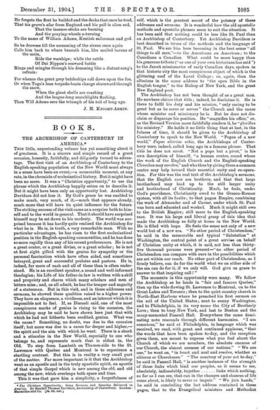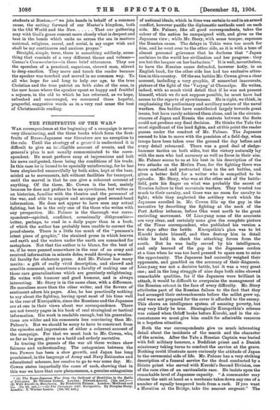Tins little, unpretending volume has yet something about it of
greatness. It is a sincere and simple record of a great occasion, honestly, faithfully, and diligently turned to advan- tage. The first visit of an Archbishop of Canterbury to the English-speaking population of the New World must always in a sense have been an event,—a memorable moment, at any rate, in the chronicle of ecclesiastical history. But it might have been no more. It was a "Christian opportunity," to use the phrase which the Archbishop happily seizes on to describe it. But it might have been only an opportunity lost. Archbishop Davidson did not lose it. By God's grace he was enabled to make much, very much, of it,—much that appears already, much more that will have its quiet influence for the future. The striking success of the visit came as a surprise both to him- self and to the world in general. That it should have surprised himself may be set down to his modesty. The world was sur- prised because it has hardly quite realised the Archbishop for what he is. He is, in truth, a very remarkable man. With no particular advantages, he has risen to the first ecclesiastical position in the English-speaking communities, and he has done so more rapidly than any of his recent predecessors. He is not a great orator, or a great divine, or a great scholar ; he is not at first sight gifted with the genius for sympathy or the personal fascination which have often aided, and sometimes betrayed, great and successful prelates and pastors. He is, indeed, far more of each and all of these than is often under- stood. He is an excellent speaker, a sound and well-informed theologian; his Life of his father-in-law is written with a skill and propriety and charm which many scholars and men of letters miss ; and, as all admit, he has the temper and sagacity of a statesman. But in this visit, and in these addresses and sermons, he showed these qualities raised to a higher power. They have an eloquence, a vividness, and an interest which it is impossible not to feel. If, as Disraeli said, one of the most conspicuous marks of genius is rising to the occasion, the Archbishop may be said to have shown here just that with which he had not hitherto been credited, genius. What was the cause ? Something, no doubt, was due to the occasion itself; but more was due to a cause far deeper and higher,— the spirit and the aim with which he went. There is a shock and a stimulus in the New World, especially to one who belongs to, and represents much that is oldest in, the Old. To step from Lambeth on Thames-side to the St Lawrence with Quebec and Montreal is to experience a startling contrast. But this is in reality a very small part of the matter. Far more important is it that the Archbishop went as an apostle and in the truly apostolic spirit, an apostle of that simple Gospel which is new among the old, and old among the new, which overleaps both space and time. This it was that gave him a simplicity, a forgetfulness of
• The Christian Opportunity : being Sernums and Speeches Delivered in America. By Randall Thomas Davidson, Archbishop of Canterbury. London ; Macmillan and. Co. L. 6d. net.]
self, which is the greatest secret of the potency of these addresses and sermons. It is wonderful how the old apostolic methods and apostolic phrases seem to suit the situation. It has been said that nothing could be less like St. Paul than an Archbishop of Canterbury. Yet Archbishop Davidson is best described in terms of the methods and the language of St. Paul. We see him here becoming in the best sense "all things to all men,"—to the Americans an American ; to the Canadians a Canadian. What could be more happy than his generous tribute (" as one of your own historians has said ") to the Jesuit missionaries of early Canadian days, spoken in that historic city the most conspicuous object of which is the glittering roof of the Laval College ; or, again, than the allusions in the same address to "the open Bible in the English tongue," to the Bishop of New York, and the great New England poet.
The Archbishop has not been thought of as a great man. He nowhere claims that title ; indeed, he disclaims it. He is there to fulfil his duty and his mission, "only caring to be great but as he saves or serves" the Church and the cause whose minister and missionary he is. But he does not dis- claim or disparage his position. He "magnifies his office," or, as the Revised Version more faithfully renders it, he "glorifies his ministry." He holds it no little thing that at last, in the fulness of time, it should be given to the Archbishop of Canterbury to speak to the New World. "Popes of a new world," Papas alteriets orbis, the Archbishops of Canter- bury were, indeed, called long ago in a famous phrase. That title he does not covet. "Not a pope but a pivot," is his own description of himself, "a human centre, round whom the work of the English Church and the English-speaking Churches may revolve," and who thus by giving them a common centre may help toward their essential unity and co-opera- tion. For this was the real text of the Archbishop's sermons, that the English race are brethren, and that that large brotherhood may lead up to the still larger unity and brotherhood of Christianity. Much, he feels, andel God's providence, Christianity owed to the Graeco-Roman system, with all its faults ; to that pagan Empire, combining the work of Alexander and of Caesar, under which St. Paul was born and educated and worked. Much it might still owe to the British Empire ; still more to the English-speaking race. It was his large and liberal grasp of this idea that made the Archbishop so fully at home in the New World. He is filled with hope. He feels the sense not only of a new world but of a new era. "No other period of Christendom," he said in the memorable and typical "Salutation" at Washington, the central point of a great serviee on behalf of Christian unity at which, it is said, not less than thirty- five thousand persons were present—" no other period of Christendom can compare with ours in the possibilities which are set within our reach. No other part of Christendom, as I firmly believe, can do for the world what we on either side of the sea can do for it, if we only wilL God give us grace to answer to that inspiring call ! "
The moments in this opportunity were many. We follow the Archbishop as he lands in "fair and famous Quebec," then up the wide-flowing St. Lawrence to Montreal, on to the Great Lakes and Toronto ; then to the quiet country church in North-East Harbour where he preached his first sermon on the soil of the United States ; next to sunny Washington, and to Philadelphia, in its very name the City of Brotherly Love ; then to busy New York, and last to Boston and the many-memoried Faneuil Hall. Everywhere the same domi- nating note resounds through different harmonies. "I am conscious," he said at Philadelphia, in language which was received, we read, with great and continued applause, "that the words that have been spoken to-day, and the reception given them, are meant to express what you feel about the Church of which we are members, the absolute oneness of our Church, the almost oneness of our nations." "We are one," he went on, "in heart and soul and resolve, whether as citizens or Churchmen." "The courtesy of your act to-day," he said in Faneuil Hall, "is another instance of the strength of those links which bind our peoples, as it seems to me, absolutely, indissolubly, together links which nothing, so far as I can see, that can in the changes and chances of life come about, is likely to sever or impair." "We join hands," he said in concluding the last address contained in these pages, that to the Evangelical ministers and Methodist in the Old World and the New That our gathering may with God's grace cement more closely what is deepest and best in the bonds which unite us across the sea in matters national, religious, moral, and social, is my eager wish and shall be my continuous and anxious prayer."
Straight, simple, terse, there is something soldierly, some- thing that reminds of a very different theme and volume— Caesar's Commentaries—in these brief utterances. They are the speeches of a practical, sagacious, shrewd man, stirred to deep emotion. They move and touch the reader because the speaker was touched and moved in no common way. To all who hope for and long to help our age, to the true Christian and the true patriot on both sides of the seas, in the new home where the speaker spent so happy and fruitful a sojourn, in the old to which he has returned, as we hope, refreshed and encouraged, we commend these hopeful, prayerful, suggestive words as in a very real sense the best of Christmastide reading.
THE FIRSTFRUITS OF THE WAR.*



































 Previous page
Previous page